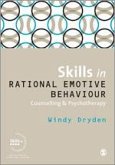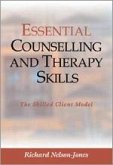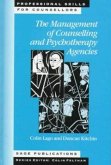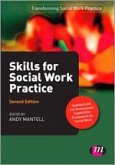Counselling Skills and Knowledge for SCoPEd B
Diversity, Self-awareness, Assessment and Research
Herausgeber: McFaul, Claudine; Frances, Tanya; Moller, Naomi; Ness, Hayley; Di Malta, Gina; Rost, Felicitas
Counselling Skills and Knowledge for SCoPEd B
Diversity, Self-awareness, Assessment and Research
Herausgeber: McFaul, Claudine; Frances, Tanya; Moller, Naomi; Ness, Hayley; Di Malta, Gina; Rost, Felicitas
- Gebundenes Buch
- Merkliste
- Auf die Merkliste
- Bewerten Bewerten
- Teilen
- Produkt teilen
- Produkterinnerung
- Produkterinnerung
This text supports you to develop the competencies aligned to the SCoPEd professional standards in counselling. It covers the core competencies in client assessment, self-awareness, and knowledge and skills.
Andere Kunden interessierten sich auch für
![The Essential Skills for Setting Up a Counselling and Psychotherapy Practice The Essential Skills for Setting Up a Counselling and Psychotherapy Practice]() Gladeana McmahonThe Essential Skills for Setting Up a Counselling and Psychotherapy Practice135,99 €
Gladeana McmahonThe Essential Skills for Setting Up a Counselling and Psychotherapy Practice135,99 €![Skills in Rational Emotive Behaviour Counselling & Psychotherapy Skills in Rational Emotive Behaviour Counselling & Psychotherapy]() Windy DrydenSkills in Rational Emotive Behaviour Counselling & Psychotherapy167,99 €
Windy DrydenSkills in Rational Emotive Behaviour Counselling & Psychotherapy167,99 €![Essential Counselling and Therapy Skills Essential Counselling and Therapy Skills]() Richard Nelson-JonesEssential Counselling and Therapy Skills217,99 €
Richard Nelson-JonesEssential Counselling and Therapy Skills217,99 €![The Management of Counselling and Psychotherapy Agencies The Management of Counselling and Psychotherapy Agencies]() Colin LagoThe Management of Counselling and Psychotherapy Agencies168,99 €
Colin LagoThe Management of Counselling and Psychotherapy Agencies168,99 €![Pastoral Care & Counselling Pastoral Care & Counselling]() Gordon LynchPastoral Care & Counselling185,99 €
Gordon LynchPastoral Care & Counselling185,99 €![Skills for Social Work Practice Skills for Social Work Practice]() Andy MantellSkills for Social Work Practice158,99 €
Andy MantellSkills for Social Work Practice158,99 €![Counselling and Psychotherapy in Private Practice Counselling and Psychotherapy in Private Practice]() Roger ThistleCounselling and Psychotherapy in Private Practice170,99 €
Roger ThistleCounselling and Psychotherapy in Private Practice170,99 €-
-
-
This text supports you to develop the competencies aligned to the SCoPEd professional standards in counselling. It covers the core competencies in client assessment, self-awareness, and knowledge and skills.
Produktdetails
- Produktdetails
- Verlag: Sage Publications Ltd
- Seitenzahl: 512
- Erscheinungstermin: 8. November 2025
- Englisch
- ISBN-13: 9781036212421
- ISBN-10: 1036212424
- Artikelnr.: 74709645
- Herstellerkennzeichnung
- Libri GmbH
- Europaallee 1
- 36244 Bad Hersfeld
- gpsr@libri.de
- Verlag: Sage Publications Ltd
- Seitenzahl: 512
- Erscheinungstermin: 8. November 2025
- Englisch
- ISBN-13: 9781036212421
- ISBN-10: 1036212424
- Artikelnr.: 74709645
- Herstellerkennzeichnung
- Libri GmbH
- Europaallee 1
- 36244 Bad Hersfeld
- gpsr@libri.de
Part 1: Diversity
Chapter 1: Developing culturally sensitive understandings of psychological
distress - Tanya Frances
Chapter 2: Identity, culture and engagement in the therapeutic relationship
- Sharon Frazer-Carroll
Chapter 3: Developing self-awareness in working with diversity - Zoë
Boden-Stuart
Chapter 4: Recognising and working with the decolonised self - Dwight
Turner
Part 2: Reflexivity
Chapter 5: Using reflexivity in counselling - Jennie Kirk
Chapter 6: Working with unconscious and out-of-awareness processes -
Felicitas Rost, Naomi Moller
Chapter 7: Using reflexivity to develop and maintain emotional fitness -
Claudine McFaul
Chapter 8: Using reflexivity in supervision - Trudi Macagnino
Part 3: Assessment
Chapter 9: Foundations of psychological assessment - Gina Di Malta
Chapter 10: Working with risk - Andrew Reeves
Chapter 11: Conceptualising and assessing mental health difficulties -
Naomi Moller
Chapter 12: Using outcome measures to inform psychological assessment -
Gina Di Malta, Jo-anne Carlyle and Chris Evans
Part 4: Research
Chapter 13: Why research matters for counsellors - Femke Truijens and
Rebeka Pàzmànyovà
Chapter 14: Understanding and using quantitative research evidence -
Felicitas Rost
Chapter 15: Understanding and using qualitative research evidence - Zoë
Boden-Stuart
Chapter 16: Mixing methods for research-practice integration - Felicitas
Rost and Femke Truijens
Part 5: Developing as a practitioner
Chapter 17: Online counselling - Andreas Vossler
Chapter 18: Complex formulation and meaning making - Hayley Ness
Chapter 19: Thinking critically about counselling and psychotherapy -
Hayley Ness and Naomi Moller
Chapter 20: Adapting your way of working for individual clients - Kate
Smith
Chapter 1: Developing culturally sensitive understandings of psychological
distress - Tanya Frances
Chapter 2: Identity, culture and engagement in the therapeutic relationship
- Sharon Frazer-Carroll
Chapter 3: Developing self-awareness in working with diversity - Zoë
Boden-Stuart
Chapter 4: Recognising and working with the decolonised self - Dwight
Turner
Part 2: Reflexivity
Chapter 5: Using reflexivity in counselling - Jennie Kirk
Chapter 6: Working with unconscious and out-of-awareness processes -
Felicitas Rost, Naomi Moller
Chapter 7: Using reflexivity to develop and maintain emotional fitness -
Claudine McFaul
Chapter 8: Using reflexivity in supervision - Trudi Macagnino
Part 3: Assessment
Chapter 9: Foundations of psychological assessment - Gina Di Malta
Chapter 10: Working with risk - Andrew Reeves
Chapter 11: Conceptualising and assessing mental health difficulties -
Naomi Moller
Chapter 12: Using outcome measures to inform psychological assessment -
Gina Di Malta, Jo-anne Carlyle and Chris Evans
Part 4: Research
Chapter 13: Why research matters for counsellors - Femke Truijens and
Rebeka Pàzmànyovà
Chapter 14: Understanding and using quantitative research evidence -
Felicitas Rost
Chapter 15: Understanding and using qualitative research evidence - Zoë
Boden-Stuart
Chapter 16: Mixing methods for research-practice integration - Felicitas
Rost and Femke Truijens
Part 5: Developing as a practitioner
Chapter 17: Online counselling - Andreas Vossler
Chapter 18: Complex formulation and meaning making - Hayley Ness
Chapter 19: Thinking critically about counselling and psychotherapy -
Hayley Ness and Naomi Moller
Chapter 20: Adapting your way of working for individual clients - Kate
Smith
Part 1: Diversity
Chapter 1: Developing culturally sensitive understandings of psychological
distress - Tanya Frances
Chapter 2: Identity, culture and engagement in the therapeutic relationship
- Sharon Frazer-Carroll
Chapter 3: Developing self-awareness in working with diversity - Zoë
Boden-Stuart
Chapter 4: Recognising and working with the decolonised self - Dwight
Turner
Part 2: Reflexivity
Chapter 5: Using reflexivity in counselling - Jennie Kirk
Chapter 6: Working with unconscious and out-of-awareness processes -
Felicitas Rost, Naomi Moller
Chapter 7: Using reflexivity to develop and maintain emotional fitness -
Claudine McFaul
Chapter 8: Using reflexivity in supervision - Trudi Macagnino
Part 3: Assessment
Chapter 9: Foundations of psychological assessment - Gina Di Malta
Chapter 10: Working with risk - Andrew Reeves
Chapter 11: Conceptualising and assessing mental health difficulties -
Naomi Moller
Chapter 12: Using outcome measures to inform psychological assessment -
Gina Di Malta, Jo-anne Carlyle and Chris Evans
Part 4: Research
Chapter 13: Why research matters for counsellors - Femke Truijens and
Rebeka Pàzmànyovà
Chapter 14: Understanding and using quantitative research evidence -
Felicitas Rost
Chapter 15: Understanding and using qualitative research evidence - Zoë
Boden-Stuart
Chapter 16: Mixing methods for research-practice integration - Felicitas
Rost and Femke Truijens
Part 5: Developing as a practitioner
Chapter 17: Online counselling - Andreas Vossler
Chapter 18: Complex formulation and meaning making - Hayley Ness
Chapter 19: Thinking critically about counselling and psychotherapy -
Hayley Ness and Naomi Moller
Chapter 20: Adapting your way of working for individual clients - Kate
Smith
Chapter 1: Developing culturally sensitive understandings of psychological
distress - Tanya Frances
Chapter 2: Identity, culture and engagement in the therapeutic relationship
- Sharon Frazer-Carroll
Chapter 3: Developing self-awareness in working with diversity - Zoë
Boden-Stuart
Chapter 4: Recognising and working with the decolonised self - Dwight
Turner
Part 2: Reflexivity
Chapter 5: Using reflexivity in counselling - Jennie Kirk
Chapter 6: Working with unconscious and out-of-awareness processes -
Felicitas Rost, Naomi Moller
Chapter 7: Using reflexivity to develop and maintain emotional fitness -
Claudine McFaul
Chapter 8: Using reflexivity in supervision - Trudi Macagnino
Part 3: Assessment
Chapter 9: Foundations of psychological assessment - Gina Di Malta
Chapter 10: Working with risk - Andrew Reeves
Chapter 11: Conceptualising and assessing mental health difficulties -
Naomi Moller
Chapter 12: Using outcome measures to inform psychological assessment -
Gina Di Malta, Jo-anne Carlyle and Chris Evans
Part 4: Research
Chapter 13: Why research matters for counsellors - Femke Truijens and
Rebeka Pàzmànyovà
Chapter 14: Understanding and using quantitative research evidence -
Felicitas Rost
Chapter 15: Understanding and using qualitative research evidence - Zoë
Boden-Stuart
Chapter 16: Mixing methods for research-practice integration - Felicitas
Rost and Femke Truijens
Part 5: Developing as a practitioner
Chapter 17: Online counselling - Andreas Vossler
Chapter 18: Complex formulation and meaning making - Hayley Ness
Chapter 19: Thinking critically about counselling and psychotherapy -
Hayley Ness and Naomi Moller
Chapter 20: Adapting your way of working for individual clients - Kate
Smith








